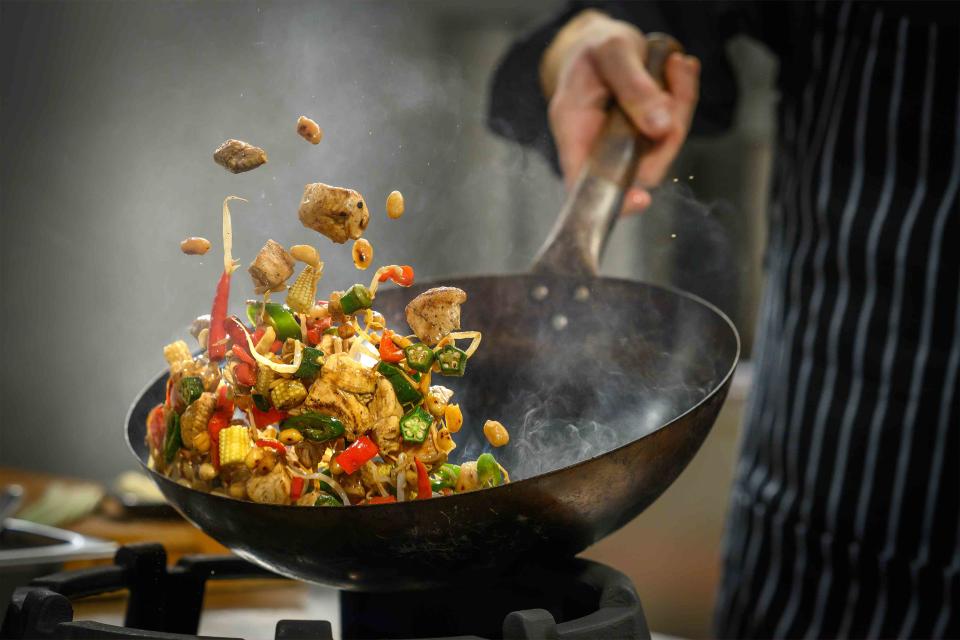Maneet Chauhan Spills the Biggest Misconception About Cooking Competition Shows
Turns out the judges don't really care about sob stories after all.

Getty
Do you ever wonder what it’s really like to compete in a televised cooking competition? Do the chef-contestants actually get more time to cook than it appears? Do the producers tell the judges who should be eliminated and who should win? Just how real is a food reality show, exactly?
“There’s this complete mania around food competitions,” says chef Maneet Chauhan, who has been participating in cooking competitions for over 10 years. “It’s become a sport. It’s become the Super Bowl.” At the 41st Food & Wine Classic in Aspen, Chauhan will join other cooking show alums, including Stephanie Izard, Shota Nakajima, and Claudette Zepeda, for the Cooking Competition Confessional: Behind the Scenes panel, where they’ll uncover all of the unspoken realities of what it’s really like to be on a cooking competition.
Related: The Food Styling Secrets Behind the Hit Show 'Lessons In Chemistry'
Ahead of the panel, we sat down with Chauhan to get the behind-the-scenes secrets of some of your favorite Food Network, Bravo, and Netflix cooking tournaments. Here are the five most intriguing revelations.
It takes a while to get used to all the cameras
“I remember the first time that I was on television, I was aware of each and every camera around me, and now I could give two hoots,” she says. “When I’m competing, I put my head down and I go. I’m not concerned about anything or what’s going on. But then when I’m sitting and watching [it], I’m like, ‘yeah, that was a baller move.’ Are there moments that I see myself on TV and cringe? Yes. But I think that’s more valuable for the viewers because it shows your vulnerability. It’s okay to be vulnerable. It’s okay to make mistakes. That’s one of the biggest lessons you can give the next generation.”
"It’s okay to be vulnerable. It’s okay to make mistakes. That’s one of the biggest lessons you can give the next generation."
Maneet Chauhan
The time limits are as real (and as intense) as they look
Time moves fast in televised cooking competitions — especially when six hours is edited down to six minutes. It’s hard to believe that a chef can bake a cake in less than an hour, or that a child could hand-make pasta in less than thirty, but Chauhan assures us, the time limits given by the judges are very real. “The drama you get is because of [the limited] time,” says Chauhan. All that sweat, all that panic, and all those moments rushing to make sure every ingredient in the Mystery Box makes it on the plate, comes from the short time limits. If a show were to fake it, they'd be sacrificing all the intensity necessary to create a compelling viewing experience.
Unfamiliar kitchens are just as challenging as a short time limit
“In cooking competitions, you hear about time limitations, you hear about ingredient limitations, but you do not hear about space limitations,” says Chauhan. It’s not that chef-contestants are forced to cook in kitchens that are physically too small (even though, depending on the show, that could be a part of the challenge as well) — it’s that the studio kitchens are completely new, unfamiliar environments.
Related: The Top 'Top Chef' Dishes From 20 Seasons, According to Padma Lakshmi and Gail Simmons
“What you cook in your kitchen is very different from what you would be cooking in a kitchen that you’ve never stepped into.” Not only is it difficult to remember where the equipment and ingredients are located, but a chefs’ creativity is often stifled by the lack of stability. “In cooking competitions, you are not in control, and as chefs that’s one of the most frustrating things because we like to be in control of everything.”
The judges care way more about the contestants’ food than their stories
According to Chauhan, one of the most important things about judging a food competition is being pragmatic. “You’ve got to be dispassionate about it in the sense that you’ve got to stop associating the person with the food,” she says. “Everybody has a story, and there may be stories that [the judge] relates with or stories where guilt kicks in. But as a judge, you’re judging the food — you’re not judging the story. And as human beings, that becomes a very difficult thing to do. So to me, that is one of the biggest challenges of judging, and that’s why I believe that when blind judging is involved, you get the most honest feedback.”
Cooking competitions have become more serious
When Chauhan first started participating in cooking competitions, she felt like anyone who was interested in competing could get the opportunity. “Now, I think the biggest change has been the caliber of talent,” she says. “The amazing part about what we do in competition cooking is the amount of respect we have for someone who has really done a good job. They did a good job, and that’s why they won. And I think that is a very gratifying experience to have.”
For more Food & Wine news, make sure to sign up for our newsletter!
Read the original article on Food & Wine.

 Yahoo News
Yahoo News 
